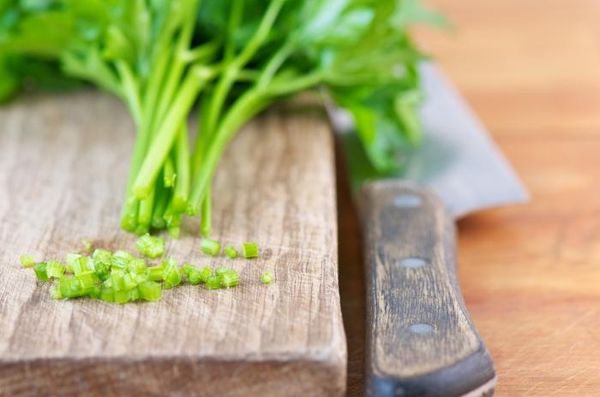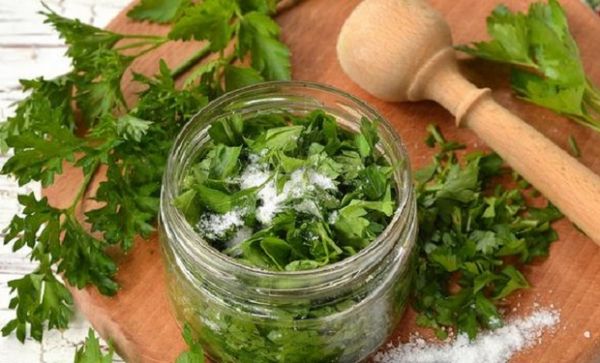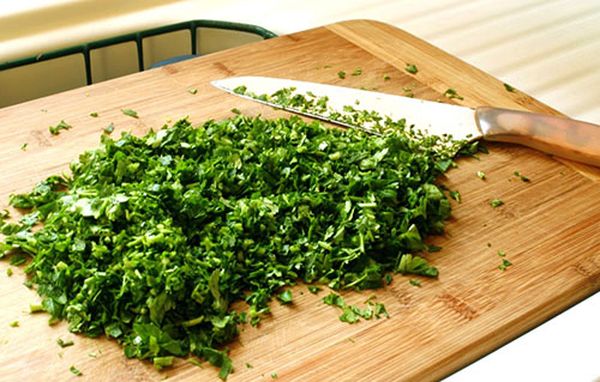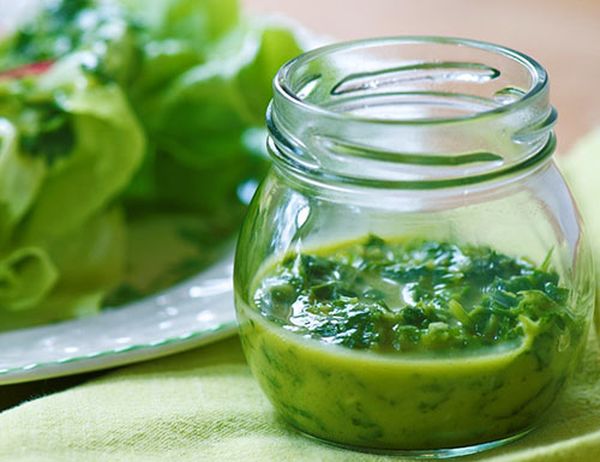Recipes for preserving and drying aromatic parsley for the winter
Freezing
Freezing greens and roots allows you to save up to 90% of the vitamins and essential oils contained in parsley. This should be done on time: twigs with leaves are frozen in the summer, while the roots are dug up and harvested in the fall.
The step-by-step instruction looks like this:
- The cut greens are sorted out, discarding random blades of grass, dry and sluggish leaves, twigs.
- Then all the collected material is washed and dried to remove excess moisture. This must be done quickly. The easiest way is to spread it out for 10–20 minutes on a cotton towel, but not on paper napkins.
- The next stage is cutting (if it is decided to freeze chopped parsley). It can be finely chopped with a knife - separately tender branches with leaves and rough stems. If whole branches are frozen, they can be used for decoration.
- Further, the raw materials are laid out in small portioned bags, and the branches are simply wrapped with cling film. You can, of course, collect all the chopped greens in one bag, but it's easier to use each portion separately. The bags are placed in the freezer.
- It is very convenient to arrange chopped greens in ice cube trays. They are tamped tightly, topped up with water, frozen, and then removed from the molds, poured into a bag for storage. You can fill it not with water, but with oil - such ice floes are good to use when stewing meat or preparing a stew. So you can freeze not one parsley, but a whole mixture of herbs, adding chopped garlic if desired.
- If you do not need to preserve the appearance, then it is very convenient to grind the greens with a blender, then you do not need to add water to the ice molds, your own parsley juice will freeze.
The roots are also frozen - they are pre-cleaned, cut into small pieces, kept in air for several minutes to dry the slices.
Video "Harvesting parsley for the winter"
In this video, you will learn how to properly freeze parsley for the winter.
Salting
Our ancestors knew exactly how to properly salt parsley for the winter, because they did not have refrigerators. They do this now, just remember that first they put the salted parsley in the dish, then they try it, and only then, if necessary, they salt it:
- The grass is prepared for salting, as for all blanks: cut, sorted, washed, dried, finely cut.
- Then the chopped parsley mass is mixed with salt, and for every 5 parts of greens, 1 part of salt is taken.
- The mixture is tightly packed in a jar, without fail leaving room for the juice that comes out, tightly closed with a lid. Store in the refrigerator.
There is another recipe that uses more salt. It is recommended to apply in layers: 1 cm of salt is poured on the bottom, a centimeter layer of parsley is placed on top (dill is also salted), then salt again, salt should be under the lid.
Drying
Dried parsley is able to preserve its aroma and color; it is not for nothing that this method of harvesting herbs has been and remains very popular. They say that less nutrients remain than when frozen, but dried sprigs of parsley, dill, and other herbs are often put in pickles when harvesting vegetables.
You can dry whole twigs by hanging small portioned bouquets upside down in a shady place or ventilated area.And you can finely chop, and separately dry the leaves with thin twigs, rough stems, roots.
Dried leaves are not put in salads, they are usually used to prepare hot first and second courses, so many housewives believe that it is not necessary to wash the grass before drying, especially since excess moisture complicates the process.
It is enough to sort out the parsley, shake it off the ground, cut it. Then it is laid out in a thin layer on trays or baking sheets covered with paper (preferably parchment). A shaded place is determined for the trays, the grass is periodically stirred by hand. After 2-3 days, dry parsley can be poured into a jar, closed with a lid. Store at room temperature out of sunlight.
If conditions do not allow drying in this way, you can use a slightly open oven, heating it to 60 ° C. The best results will be obtained from an electric dryer specially designed for harvesting fruits, herbs, vegetables.
Pickling
This method allows you to prepare a whole spicy dish that can be safely offered with meat, fish, vegetables:
- First, jars are prepared: washed, disinfected, dried.
- Then, fragrant leaves of horseradish, currants, cherries are spread on the bottom, and chopped prepared parsley is placed on top.
- Then it is poured with marinade. For him, salt is dissolved in water (1 tbsp of salt is taken for 1 liter of water), a couple of bay leaves, a few peas of allspice are added, brought to a boil, vinegar (1 tbsp) is poured in, removed from the heat.
- The cans are covered with lids, sterilized for 15 minutes (for a half-liter jar), rolled up with lids, and put away for storage after cooling. If you do not roll it up, but close it with nylon lids, you will have to store it in the cold.
In oil
Refined vegetable oil acts as an excellent preservative, it does not allow air to penetrate the cut grass, thereby preserving it perfectly. The greens stored in this way make a good ready-made salad dressing with oil that gradually absorbs the parsley flavor.
The cut grass is put in a glass jar, not tamped, but poured abundantly with oil on top. It should penetrate inside, displacing all the air around the leaves, and remain in a thick layer above the greenery. You need to store such a workpiece in the refrigerator.
Fresh parsley cannot be stored for a long time, it gradually loses moisture, withers, turns yellow, so it must be prepared for the winter in the midst of the green season, that is, in the first half of summer.
Whichever method is chosen, it is advisable to start processing on the same day when the branches were cut, which guarantees the preservation of nutrients, color and aroma.





